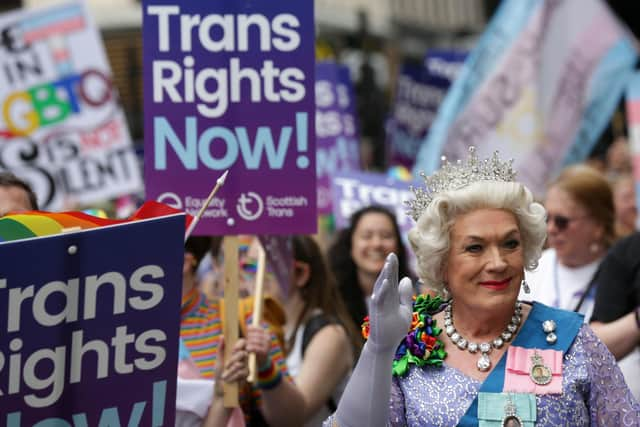UK Government reduces cost of officially changing gender
In response to a consultation on reform of the Gender Recognition Act (GRA) in England and Wales, women and equalities minister Liz Truss has said that from Tuesday, applicants will only pay the nominal fee, ensuring the process is more affordable.
The move will extend to Scotland as, despite the legislation on gender recognition being devolved, the granting of Gender Recognition Certificates (GRC) is done at a UK level.
Advertisement
Hide AdAdvertisement
Hide AdMinisters had pledged in September last year to reduce the cost of legally changing gender after deciding against wider reforms, including rejecting calls for people to be able to self-identify their gender and change their birth certificates without a medical diagnosis.


Ms Truss said: “As we build back better, we want transgender people to be free to live and to prosper in modern Britain.
“In the National LGBT Survey, 34 per cent of transgender people told us that the cost of applying for a certificate was holding them back from doing so.
"Today we have removed that barrier and I am proud that we have made the process of getting a certificate fairer, simpler and much more affordable.”
As of December last year, there has been a total of 5,871 full GRCs granted since 2005, yet tentative estimates suggest there are an estimated 200,000 to 500,000 transgender people living in the UK.
The existing process of gaining a GRC – which requires two medical reports – has been criticised as costly and bureaucratic. One option considered was to remove the medical diagnosis element and allow people to legally change gender through self-identification.
However, after concerns raised by women’s organisations about a potential conflict with self-ID and women’s rights in the Equality Act 2010, the UK Government in September last year announced it would not fundamentally reform the process, arguing the “balance struck” in the existing legislation was “correct”, with Ms Truss saying there were “proper checks and balances in the system”.
She said the government hoped that modernising the process would allow more transgender people to legally change their sex with a GRC should they wish to do so.
Advertisement
Hide AdAdvertisement
Hide AdHowever, Vic Valentine of the Scottish Trans Alliance said while the fee reduction was welcome, it “doesn't solve the problems with the current requirements placed on trans people to be able to update our birth certificates”.
"We hope that the next Scottish Government will make the proper changes needed in Scotland, so that rather than just a cheaper version of a process that many trans people tell us is intrusive, humiliating and distressing, it truly is fairer and simpler,” he said.
The announcement by the UK Government comes as Westminster’s women and equalities committee is in the process of examining if the government’s proposed reforms are the right ones and if they go far enough.
The SNP, which was bitterly divided over the issue of self-identification, has said in its manifesto that it still intends to reform the GRA in “consultation with trans people, women, equality groups, legal and human rights experts”.
A message from the Editor:Thank you for reading this article. We're more reliant on your support than ever as the shift in consumer habits brought about by Coronavirus impacts our advertisers.
If you haven't already, please consider supporting our trusted, fact-checked journalism by taking out a digital subscription.
Comments
Want to join the conversation? Please or to comment on this article.
